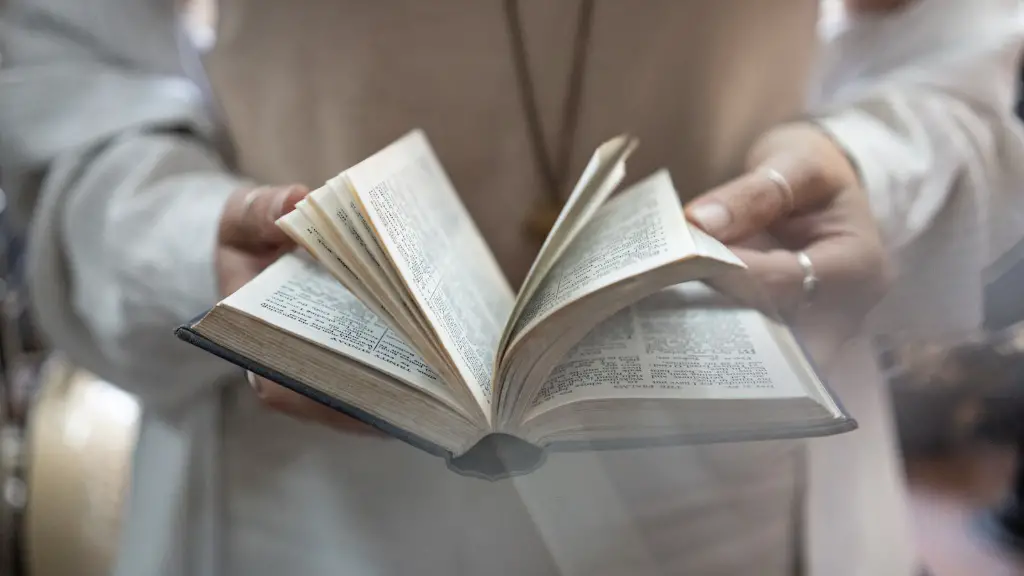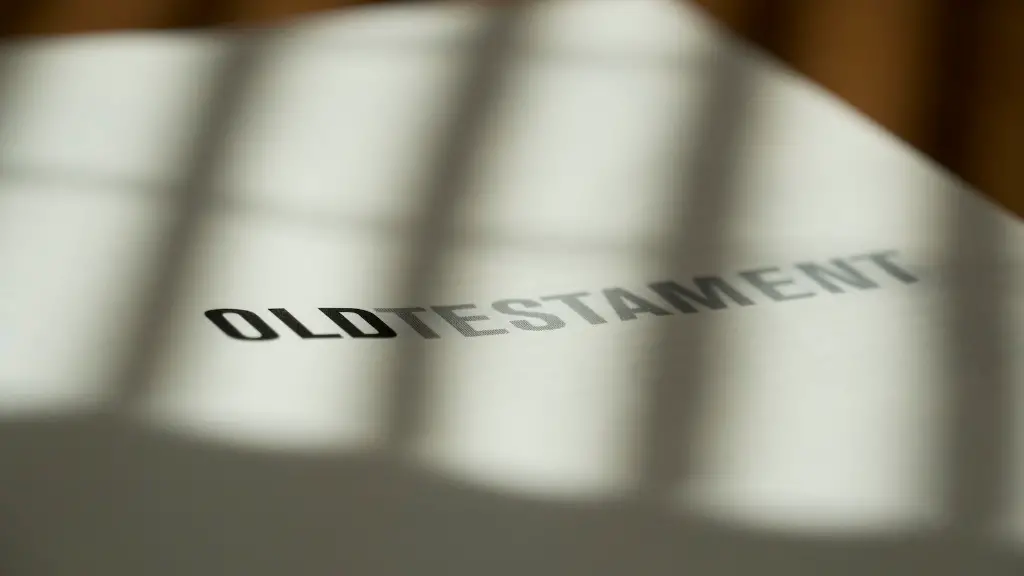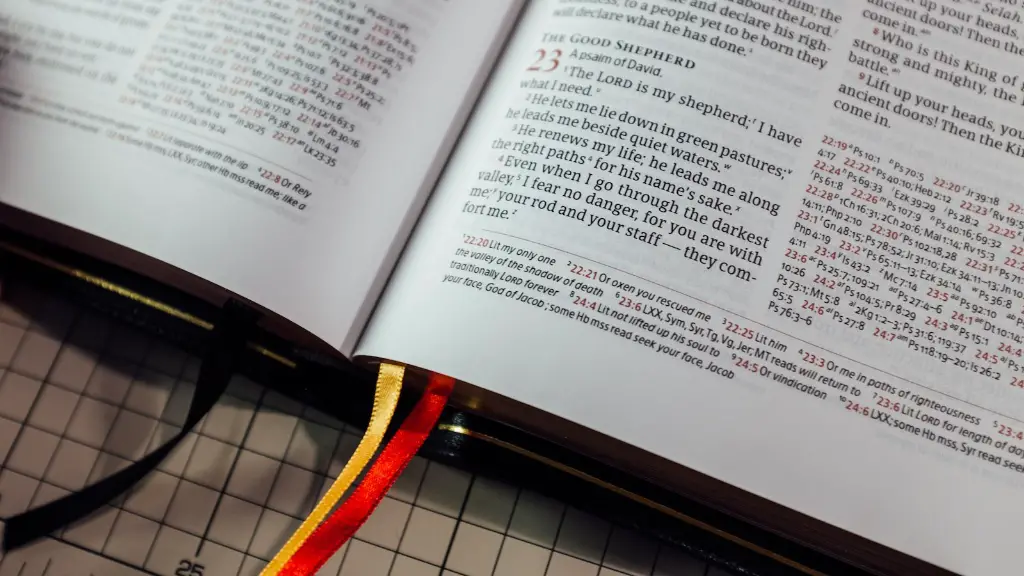The Bible is full of fascinating stories and many believers use it as a spiritual guide in their lives. But does the Bible actually say anything about cremation and the resurrection of a dead body? The answer is not as clear-cut as one might think.
Cremation is the process of burning a dead body so that it is reduced to ashes. For many centuries in the Western world, it was considered unacceptable and very few people chose to be cremated. However, the trend has been changing. Cremation is becoming much more common in the U.S and around the world. In 2019, cremation accounted for almost two thirds of all U.S funerals, according to the Cremation Association of North America.
Christian denominations have long had different views on this issue. Roman Catholic teachings historically opposed cremation, and even today, the Church discourages it except when it is the only way to prevent the spread of disease. The Orthodox Church also generally disapproves of cremation, but does not forbid it. Most Protestant denominations, however, have no particular position on cremation and allow it according to individual preference.
What does the Bible actually say about cremation? Surprisingly, not much. There are no explicit Bible verses that clearly forbid it, but there are a few passages that could be interpreted as warning against it. In Deuteronomy 14:1-2, God tells the Israelites “You are the children of the Lord your God; you shall not cut yourselves nor shave the front of your head for the dead.” Some believers interpret this to mean that they should not stand by and watch while their deceased relatives are cremated.
So, what does this mean for the question of whether a cremated body can rise? The Bible does not explicitly answer this question, and it is ultimately up to individuals to interpret the Biblical text and decide how to apply it to their own lives. The message the Bible does make clear, however, is that God cares about us and does not want us to grieve in unhealthy ways or take part in potentially dangerous rituals.
What Science Says About Cremation
Modern science has made great strides in recent years, and this has also changed our views about cremation. From a scientific perspective, the process of cremation does not destroy the body completely. It reduces the body to its basic elements and leaves behind a kind of “ash”. It may also leave behind small pieces of bone, which are then ground into a finer powder. This powder can be kept in an urn or scattered in a special place.
From a scientific perspective, the process of cremation does not prevent the dead body from “rising” in the afterlife. It simply reduces it to its basic elements, which can then be used to create a new form of life if God so chooses. As with any decision in life, however, it is ultimately up to each individual to decide whether cremation is the right choice for them.
The Passages In The Bible About Resurrection
Study of the Bible reveals that God is clear about what happens to us when we die, and it is full of passages about resurrection of the dead. For example, in John 5:28-29 Jesus says “Do not be amazed at this, for the hour is coming in which all who are in the graves will hear His voice and come forth—those who have done good, to the resurrection of life, and those who have done evil, to the resurrection of condemnation.”
This suggests that no matter how a person dies or what happens to their body after death, they will still rise again. The Bible promises that those who have faith in Jesus Christ and receive the gift of eternal life will rise with a new body to a new life. So, in this sense, the Bible does imply that even those who are cremated may be resurrected.
The Spiritual Implications Of Cremation
Cremation is an important spiritual issue for many Christian believers. Although there is no clear answer in the Bible as to whether cremation is acceptable, there are certain spiritual implications to consider. For example, some believers feel that cremation shows a lack of respect for the dead, and they view it as an affront to God. Others feel that they need to preserve the body in order to properly grieve and to ensure the physical resurrection of their loved one.
Ultimately, it is up to each individual to decide whether they are comfortable with cremation and to make a decision based on their faith, values, and beliefs. Some believers even choose to be cremated in order to be able to better experience and explore their spiritual journeys after death.
Conclusion
Ultimately, there is no clear answer as to whether or not the Bible says that a cremated body cannot rise. While some Christians believe cremation to be incompatible with Biblical teachings, others see it as an acceptable choice. Ultimately, it is up to each individual to decide what is most in line with their spiritual beliefs.
Theological Perspectives On Cremation
Different Christian theologians have weighed in on this issue with varied perspectives. Some see the process of cremation as nothing more than the physical destruction of a dead body and, thus, as compatible with beliefs about the resurrection. Others view it as a kind of violation of the biblical commandment not to “mutilate” a body, and thus as incompatible with belief in physical resurrection. It is clear, however, that there is much disagreement among theologians on this sensitive issue.
The Meaning Of Cremation For Believers
For many believers, the decision to be cremated or not can have a significant emotional and spiritual meaning. Some people feel that cremation allows them to be released to eternal life, while others feel that it removes the possibility of an afterlife and should be avoided. Still others feel that cremation is a valid choice, as long as it does not conflict with the teachings of their religion.
It is important to consider the meaning of cremation for each individual believer. Ultimately, it is a personal decision that should only be made after carefully considering all of the available information, traditional and biblical teachings, and one’s own beliefs and values.
Environmental Impact Of Cremation
Finally, the environmental impact of cremation should also be taken into consideration. The process of cremation produces a significant amount of carbon dioxide, which contributes to global warming. While many cemeteries are more concerned with the aesthetic impact rather than the environmental consequences of traditional burials, some advocates argue that cremation is a more environmentally friendly option than traditional burials.
Cremation also has other environmental implications, such as the production of crematoria waste and the use of resources such as energy, fuel, and water. It is important that both individuals and religious organizations consider the environmental effects of cremation when making decisions about the disposal of remains.
Cultural Practices Regarding Cremation
Cultural attitudes towards cremation also vary. In some cultures, it is viewed as a sacred ritual, while in others it is seen as a practical or aesthetic necessity. In India, for example, cremation is a deeply spiritual process, and is seen as the only way for the soul to be released and to reunite with the divine. In other traditional cultures, such as in China, cremation is a practical solution for managing the limited space available in burial grounds. Thus, it is important to understand the cultural views of cremation before making any decisions.
Modern Attitudes Toward Cremation
As previously mentioned, cremation is becoming much more common in the U.S. and around the world. According to a recent study by the Pew Research Center, 63% of Americans plan to be cremated when they die. The most common reason for choosing cremation is because it is a more environmentally friendly option than traditional burial. It is also much less expensive, and easier to arrange.
Although cremation is becoming much more common in modern society, it is still an intensely personal decision that should be made with care. Each individual should weigh the spiritual, environmental, and practical implications of the decision and make the choice that is right for them.




